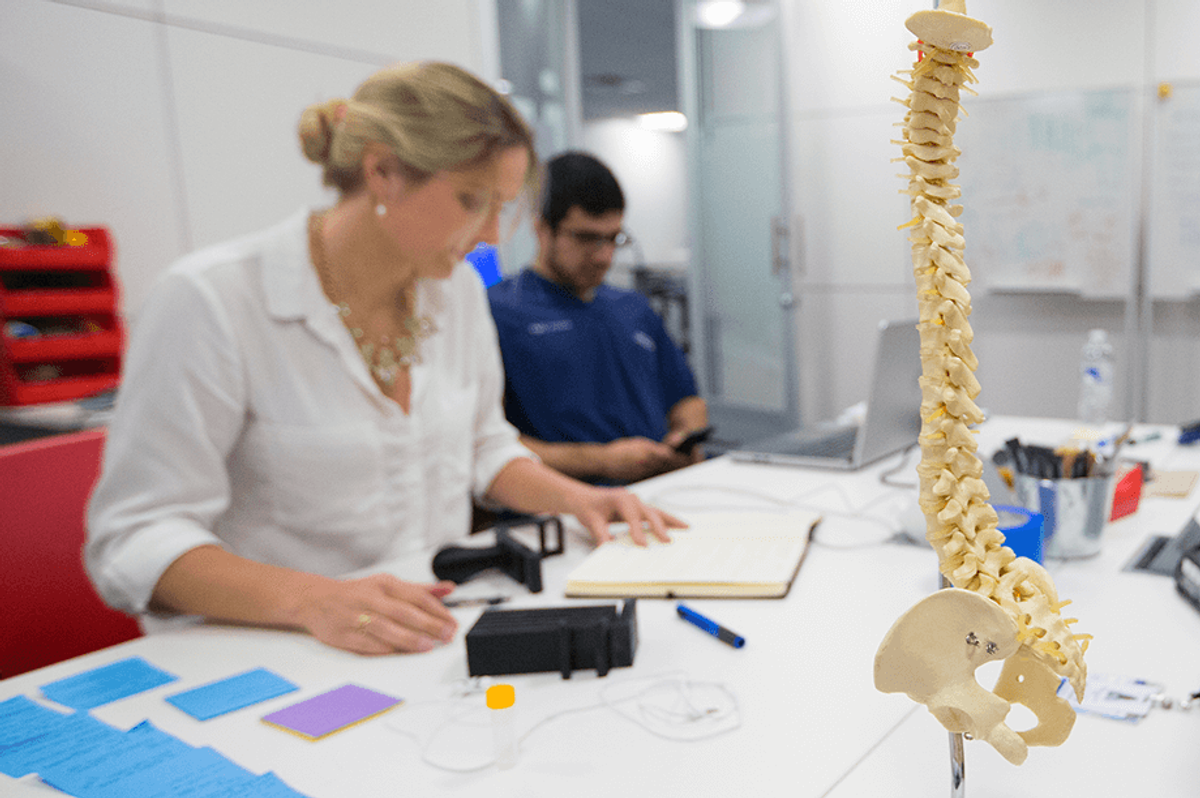Sixteen digital health and medical device startups founded in the United Kingdom have been selected for a customized accelerator at the Texas Medical Center's Innovation Factory.
In partnership with Innovate UK, TMCi created the Innovate UK Global Incubator Programme, a new accelerator that supports UK businesses as they build their United States go-to-market plan. The program builds the BioBridge relationship between TMC and the UK that was originally established five years ago.
“The TMC UK BioBridge program was launched with the UK Department for Business and Trade in 2018 to serve as a gateway for advancing life sciences and foster innovation and research between our two countries," says Ashley McPhail, chief external affairs and administration officer for TMC, in a news release. "We saw an opportunity to work with Innovate UK to develop a larger program with the UK after the success of the 11 companies that previously participated in our health tech accelerator."
The 16 companies will participate in the program from June to November. The cohort is expected to arrive in Houston on June 5 and have access to TMCi's facilities, network of mentors and potential clients, funding, potential customers, and curated programing — all while being a unique entry point into the US. The new offering joins three other globally recognized curriculums: Biodesign, Accelerator for Cancer Therapeutics, and Health Tech.
“TMCi nurtures long-term growth, development, and competitiveness to increase startups chances of success and global expansion," says Emily Reiser, associate director of TMC Innovation. "By bringing their novel technologies and exposing them to a curated selection of TMC’s expert network, startups receive support and evaluation to build, scale, and expand in the US market."
Two of the cohort's specialties include cardiovascular and oncology — two of TMC's strongest areas of expertise — with solutions ranging from surgical devices to AI-enabled risk stratification and hospital efficiency.
Innovate UK is the country's national innovation agency dedicated to supporting business-led innovation in all sectors.
“The United Kingdom is fully committed to improving global healthcare through scientific collaboration," says His Majesty’s Consul General in Texas Richard Hyde in the release. "Through the expansion of the TMC UK BioBridge and in partnership with Innovate UK, this programme will help to expose the brightest and best British companies to the world’s largest medical city. Our companies will collaborate and grow as they work to develop cutting edge technology. The partnership between the UK Government and TMC demonstrates that international collaboration can drive both economic growth and improvement to quality of life.”
The 16 companies making up the inaugural cohort are as follows, according to TMC.
- AINOSTICS aims to revolutionize the treatment and prevention of neurological conditions, such as dementia, by developing innovative AI-enabled solutions that draw novel insights from routinely acquired non-invasive medical scans to deliver accurate diagnosis and outcome prediction, and in turn facilitate personalized care and timely access to disease-modifying treatments for patients.
- Alvie is a blended human plus AI-enabled digital solution providing personalised pre and rehabilitation coaching and supportive care for cancer and surgery. Alvie's technology combines data profiling, risk-stratification and tailored prescriptions of health and well-being with curated educational content, targeted behaviour change coaching and expert support through chat messaging and virtual consultations.
- C the Signs™ is a validated AI cancer prediction platform, which can identify patients at risk of cancer at the earliest and most curable stage of the disease. Used by healthcare professionals, C the Signs can identify which tumor type a patient is at risk of and recommend the most appropriate next step in less than 30 seconds. The platform has detected over 10,000 patients with cancer, with over 50 different types of cancer diagnosed, and with a sensitivity of >98% for cancer.
- At PEP Health, We believe all patients deserve the best care possible. Our cutting-edge machine-learning technology enables healthcare organisations, regulators, and insurers the real-time, actionable insights they need to have a direct and dramatic impact on patient experiences.
- PreciousMD improves the lives of lung-cancer and other lung-related illnesses patients worldwide by enabling imaging-based diagnostics needed for personalized treatment pathways.
- Ufonia is an autonomous telemedicine company, we use large language models and voice AI to increase the capacity of clinical professionals.
- My mhealth offers digital therapeutics for a range of long-term conditions- COPD, Asthma, Diabetes and Heart Disease. Our product has been successfully deployed in the UK and India, with >100,000 users registered to date. Our solutions empower patients to self-manage their conditions, resulting in dramatic improvements in outcomes, as evidenced through multiple clinical trials and real-world evaluations.
- At Surgery Hero, we offer a clinically backed solution that ensures whole-human support before and after surgery. We help health systems, employers and health plans cut costs without sacrificing quality of care.
- Panakeia's software platform enables extremely rapid multi-omics profiling in minutes directly from routinely used tissue images without needing wet lab assays.
- QV Bioelectronics are striving to deliver longer, better quality lives for brain tumour patients. Using their first-of-its-kind implantable electric field therapy device, GRACE, QV will provide effective, focal & continuous treatment without impacting patient quality of life.
- 52 North is a med-tech company focused on improving health outcomes and health equity by reinventing care pathways. The NeutroCheck® solution is a finger-prick blood test and digital platform built to significantly improve safety and quality of life for cancer patients, by helping to identify at-home those patients who are at risk of the most fatal side-effect of chemotherapy: neutropenic sepsis.
- Somnus is fulfilling an unmet need in global healthcare by developing real-time, point of care blood propofol monitoring. Its products will improve the care of sedated and anaesthetised patients, save money for hospitals, and facilitate a major reduction in greenhouse gas emissions.
- ScubaTx is a breakthrough organ transplant preservation company established to solve the global unmet need for cost-efficient and longer-duration organ preservation technology. ScubaTx has developed a simple, small and affordable device which uses Persufflation to extend the preservation of organs.
- IBEX is on a mission to help people live active, healthy and productive lives by increasing their access to early diagnosis of osteoporosis. The IBEX BH software as medical device delvers routine, automated assessment of fracture risk from routine radiology for earlier detection and more equitable treatment of osteoporosis.
- NuVision produces products derived from donated human amniotic membrane that are used in ophthalmology to help patients with chronic, traumatic and post-surgical wounds of the eye to be treated earlier and recover more fully and more quickly. The company’s products are also used in the management of dry eye disease, a debilitating conditions that affects around 17m people in the USA.
- Calon Cardio-Technology is on a mission to improve quality of life for patients with Left Ventricular Assist devices (LVAD) and reduce the common post operative complications associated with these implantable heart pumps. We plan to do this by introducing a completely wireless heart pump system and augment patient follow-up with built-in remote monitoring capabilities.
- UK personalized surgery startup rebrands, expands to US by way of Houston ›
- TMC names 3 startups to Houston health tech accelerator ›
- TMC announces entrepreneurs, researchers joining its 2 health tech accelerators ›
- TMC Innovation names 9 companies to its latest bootcamp ›
- June 2 trending Houston innovation news - InnovationMap ›
- Rosarium Health, a TMC Innovation company, raises pre-seed - InnovationMap ›
- TMC forms BioBridge with the Netherlands - InnovationMap ›






 Apple doubles down on Houston with new production facility, training center Photo courtesy Apple.
Apple doubles down on Houston with new production facility, training center Photo courtesy Apple.